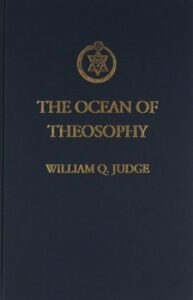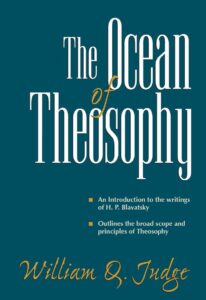Studies In The Ocean of Theosophy Part XXI
Theosophy Magazine
Vol. 22, No. 9 July 1934
pages 406 - 409
Part XXI
KARMA as viewed from the personal standpoint is usually called “good” or “bad”; but the impersonal classification of the Teachers designates it as of “three sorts,” including all phases. The first sort is “that which has not begun to produce any effect in our lives”; the second, Karma “which we are now making or storing up”; the third, that “which has begun to produce results.”
As sown grain requires favorable conditions for its fruition, so do all causes, physical or metaphysical. Hence, effects may be delayed by other forces “strong enough to temporarily prevent” their operation. Unsuitable bodily, mental, and psychical faculties with their tendencies may hold oncoming Karma quiescent, like moisture suspended in the atmosphere until precipitation is possible. It is this class that brings about the sudden and radical changes, joyful or sorrowful, so prevalent in the human drama portrayed on this Earth.
Karma of the second class, that now in the making, “will operate in the future when the appropriate body, mind, and environment are taken up” or “whenever obstructive karma is removed.” “This bears both on the present life and the next one.”
The third class, that of effects presently experienced, “is the operating now in this life on us of causes set up in previous lives.”
Rigid justice rules the world. From cause, result must flow. Thoughts, words, and acts must be accounted for. From such accounting, “none can escape either by prayer, or favor, or force, or any other intermediary.” “Rebellion is useless, for the law works on whether we weep or rejoice.” So teaches the Doctrine of Karma. Small wonder that these stern statements often strike terror to the heart when Theosophy is first contacted! For initial contact marks the first stage of transition from superstition to truth, from belief in an extraneous personal God to conception of inherent Divinity. The church elevates a “saviour,” alleged, for the paltry price of public acknowledgment, to shoulder the sins of his constituents. Between such “leaning” and the “firm position” of self-reliance and individual responsibility admonished by Theosophy, there yawns a vast abyss, seldom spanned without trepidation. Caution is then needed, lest the Teaching be poured into moulds of preconceived ideas, construing rigid justice as fatalistic inflexibility — not far removed from the all too familiar question: “If I wronged him in my last life, must he wrong me in this life?” Right of choice is forgotten, as the fact that no man can be forced to harm another. Passing strange it is, how infrequently such endless-chain suppositions are couched in terms of brotherly love and reciprocity, in accord with the inner harmony, which ever “must be restored if violated.”
Mathematically exact, Karma includes the choice of the immediate moment, precluding inflexibility. What have rebellion, weeping, rejoicing, favor, force, or intermediaries to do with restoring equilibrium and establishing justice? And since when has prayer cancelled debts? The Science of Life is the science of action. It points out facts well known, but insufficiently pondered, being usually confined to strictly objective matters. Every cause must produce an effect; and every event is an effect of prior cause, itself becoming a cause for further effects. However, no line of Karmic sequence wends a solitary way, unaffected by other lines. Events transpiring hour by hour are the grand total of all results due to manifest — combinations representing innumerable cancellations and augmentations, modified by present action; for even attitude of mind is action, and so is desire.
If effects could not be counteracted, hunger could never be appeased; for the empty stomach causing it must needs remain empty. Remedial measures, curative and palliative, are plainly mitigations of Karma. The activities of a single day abundantly demonstrate the absurdity of fatalistic conceptions; its ordinary round of duty being a succession of Karmic modifications. The dull, uneventful day may represent the net results of both punitive and compensatory Karma; its crop of evil effects cancelling the happiness that might have been; but its harvest of good preventing a day of woe. The drabness would thus include both beneficent and ill results, yet resembles neither.
“Karma, broadly speaking, may be said to be the continuance of the nature of the act.” If, then, the nature of the act be not continued, what becomes of its effect? Consider pleasure: who does not recall the forfeiture of some coveted boon through an adverse mood when the cycle for realization arrived. Joy knocked, but was rebuffed. If fortune can be so offset, the obverse must equally be true — threatened misfortune may be reduced or nullified by the establishment of opposite causes. Nothing is inevitable until it has occurred; but, even then, the manner of its reception is not inevitable. “While old karma must work out and cannot be stopped,” effects can be altered and changed in direction for better or for worse. Man is never a victim of circumstances. Each is arbiter of his own destiny, because the “spiritual nature of man is never affected or operated upon by karma.” Therefore, the aroused Spiritual Will endures shocks unswayed, and turns seeming evils into powers for good.
The final work-out of Karma is in the mind, before the vision of the Soul-Seer, Seeker of the lesson in all events, pleasing or dire. To the extent that this position is assumed, existence must necessarily become interesting and profitable. When comprehension of Life’s meaning and purpose seems more important than enjoyment and its lack more disastrous than pain, fair circumstance can no longer beguile into by-paths of selfishness, cause for future woe; difficulties will engender strength and fortitude; ailing bodies be regarded as hospitals for sick lives for which their possessor is responsible; fear and bewilderment will cease to becloud judgment.
In line with the above, is another teaching of Theosophy, concerning transmutation of Karmic effects from one plane to another. Inasmuch as this “law works on the unseen mental and karmic planes or spheres of being just as it does on the material ones,” Karma, finding no suitable channels in one department of the nature, may be drawn to that on which the fires of consciousness are chiefly centered. This may be one reason for the statement that spiritual knowledge reduces all sins to ashes. Herein is indicated the freeing power of correct philosophy, which, in its call to duty, presents the “Royal Talisman.” The flame of devotion burning in the heart is the great transmuter.
The time aspect of Karma furnishes opportunity for better bases of action. The three classes of Karma point to the Eternal Now and its wise use. The past is the Today that was; the future, the Today to be. All that remains of the past is its pent-up energies stored in the inner nature, awaiting expression. All that can be done for the future is to lay down good causes in Today that is, while its moments glide by on their way to Yesterday. Between dead past and unborn future, flits the immediate present, the only time there is for action. Now, past mistakes may be ameliorated and fairer days for the future insured, if and when discriminative choice is exercised.
Mitigation of Karma is not escape, but constructive adjustment. Retribution is not necessarily expiatory; neither is expiation inevitably retributive. Truth, like the sun, quickens all, vivifying the dormant and promoting growth, but also hastening decay and disintegration where these must take place. Theosophy offers the one Karmic short-cut from weary, futile cycles of mistakes to fulfilment of the Law by intelligent and honest living. It directs the attention from frailties to divine potentialities, from dread of punishment and craving for reward to philanthropy, from self interest to brotherhood and unity. When its idealism becomes a living force, no need for Karmic court-action!
The race is old, backward, and enormously burdened with delinquencies. Yet, “With right knowledge, or at any rate with a confident conviction that our neighbors will no more work harm to us than we would think of harming them, two-thirds of the world’s evil would vanish into thin air. Were no man to hurt his brother, Karma-Nemesis would have neither cause to work for nor weapons to act through.” Must it not be that the man refusing to act as agent for another’s retribution materially lessens his own? And oppositely that each effort in right direction by so much elevates the whole? The mass persisting in wickedness seals its own doom; hence the individual is warned against indifference, “thus moulding himself into the general average karma of his race or nation,” lest it “at last carry him off in the general destiny. This is why teachers of old cried, ‘Come ye out and be ye separate’.”
Yet, if race or nation suffer annihilation, its ensouling entities still “must go on with the task” in some other environment. Europe and America now are affording us of ancient lands and eras another chance to restore the “equilibrium of the occult cosmos” formerly disturbed by our infidelity to truth and duty. More is the pity that Jehovah should have immigrated here also and that the white man’s record on this continent have been stained by injustice to his brother and host, the red Indian! These are two of the reasons why comparatively few are moved to desert the tortuous windings of Karmic hazard, “now the ways and the high road on which move onward the great European nations;” to follow the Path of “Brotherhood in actu and altruism not simply in name.”
COMPILER’S NOTE: The following is a separate item which followed the above article but was on the same page. I felt it was useful to include it here:
“GOOD” AND “BAD” KARMA
The old definition of what is good and what bad Karma is the best. That is: “Good Karma is that which is pleasing to Ishwara, and bad that which is displeasing to Ishwara.” There is here but very little room for dispute as to poverty or wealth; for the test and measure are not according to our present evanescent human tastes and desires, but are removed to the judgment of the immortal self — Ishwara.
–William Q. Judge
Back to The Ocean of Theosophy



